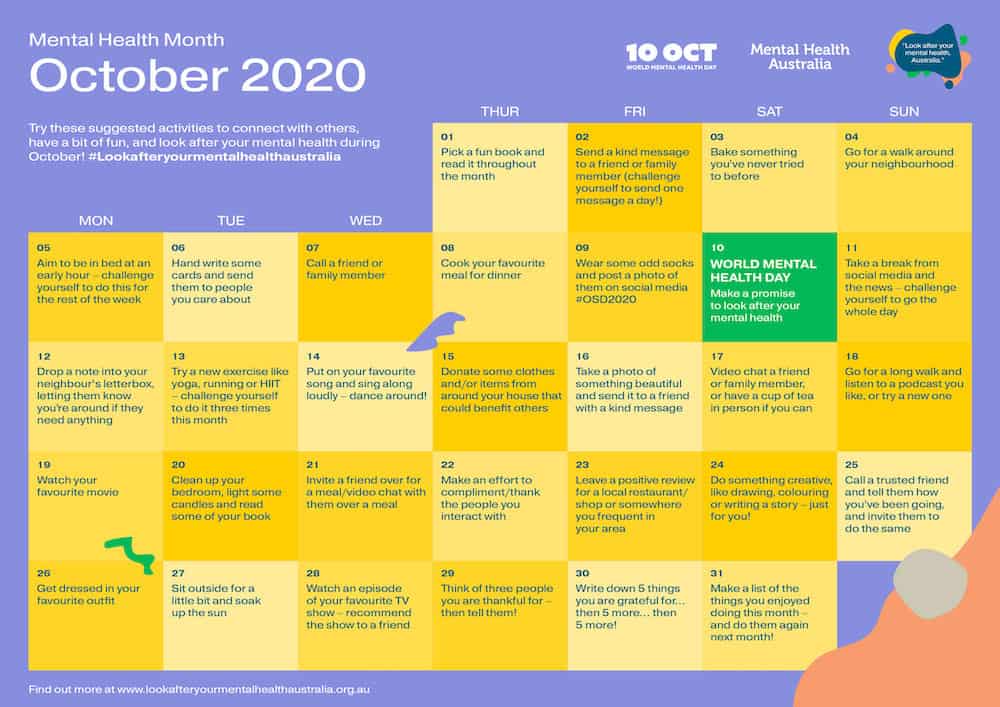What are you going to do to take part in World Mental Health Day on October 10? Mental Health Week in Australia starts on this day with the entire month of October dedicated to mental health.
This year’s theme is “Do you see what I see?” It is about challenging people’s perceptions around mental health. The purpose is to encourage you to see mental health in a more positive way. There is still a stigma surrounding mental health issues which can prevent people from seeking the support and help they need. In Australia, one in five people have mental health issues, but many do not seek help because of the stigma.
With COVID-19, lockdowns and social isolating, the world as we know it is now a completely foreign place. Levels of fear, anxiety, depression and emotional distress are affecting people now more than ever before. And this may continue into the future while the world tries to find solutions to bring the virus under control.
It is more important than ever to prioritise and look after your mental health and wellbeing.
Look after your mental health
October is a call to action to encourage everyone to promise to “Look after your mental health, Australia”. It is time to break the stigma of mental health especially during these trying times. And it does not have to be complex. You can start with the simple things in the October Mental Health Month calendar. It has actions you can take everyday to look after your mental health.

Open a conversation about mental health
For many people mental health is a difficult subject. Do you have trouble talking about your mental health? Do you worry people will reject you if they know you struggle with mental health issues? Or that it will be a negative experience that makes you feel worse? Be careful about who you tell. Do not tell just anyone. Choose the best people to talk to and the best time to open a conversation about your mental health.
Rather than keeping your struggles to yourself, it can help you to tell the people you trust. After all, people cannot reach out and support you if they do not know how you feel or what you struggle with. Here are some tips to help you open up.
Telling friends and family
Choose the friends and family you want to talk to. Try to select the people who will support you.
When you’re ready to talk:
- Make sure you both have time for a chat.
- Talk somewhere you have privacy.
- Have some examples ready of how your mental health issues affect your life.
- Let them know that you want to keep the conversation private.
- Clearly let people know when you just need them to listen and when you are seeking advice.
Telling your boss
Letting your employer know of your mental health struggles can be a good thing. While you may not want everyone at work to know, talk to your manager or human resources for support.
When you do:
- Clearly explain what your mental health concerns are.
- You do not have to tell them everything. Let them know the details you feel comfortable sharing.
- Choose the best time and place to hold the discussion. It may be good to set up a meeting time for the conversation.
- Make sure you have a plan in place in case you get upset or the conversation becomes negative.

Telling your partner
When thinking about telling your partner, consider how long you have been together. There is probably no need to tell a person you have only just met. But someone you have been with for longer needs to know how you are feeling.
When you feel ready:
- Talk to them when they are not busy doing something else. Find a time that they will sit and listen to what you have to say.
- Ask them what their attitude is towards mental health issues.
- Spend time practicing what you want to say.
- Do not tell them everything all at once.
Dealing with the stigma of mental health
Raising the awareness of mental health issues helps to reduce the stigma that still surrounds it. People can treat those with mental health conditions differently and exclude them from things everyone else naturally has in their everyday life.
When you have a mental health condition, you may take on the prejudices of others. This will affect your self-confidence and self-esteem. This can make you avoid getting treatment and withdraw from your normal life. It can even lead to substance abuse or suicidal thoughts.
You can deal with stigma by:
- Not allowing your illness to define who you are. If you have a physical illness, you are not defined by that. It is the same for mental illness. So do not become your illness, you are so much more than that. This will help others to see you as you truly are.
- Avoid taking it personally. When people are discriminative it is because they do not understand or have little experience with mental illness. Think about their attitude as being their problem Avoid making it your problem.
- Be factual. Mental illness is becoming more and more common. Find out facts and let people know when they have a negative attitude.
- Talk about your experience. The more we stay silent about mental illness, the more people think there is something is wrong. It can perpetuate the stigma. You can choose what and how much to tell people.
- Choose who to talk to. Choosing who to talk to is easier said than done. It can be much easier to talk to friends and family, and harder to talk with work colleagues. Remember, it is always your choice to talk about your mental health struggles.
Reducing the mental health stigma
To reduce mental health stigma, it helps to understand what people with mental health challenges go through. They have the same rights as anyone else so should be treated equally.
Actively dispel the myths surrounding mental health when they come up in the media or a conversation. This is unfair stereotyping of people struggling to cope and is harmful. Be informed about mental health illnesses and educate the people around you so they have a better understanding of the effects of mental health illnesses.
When describing yourself or someone else with a mental health condition, be careful of the words you use. Instead of using damaging words like crazy, psycho or nutter to describe yourself or someone else, be kind. You are not defined by your illness.
If you are having trouble with being stigmatised, talk to your doctor or mental health professional. They can give you strategies to help you deal with this better.
Simple acts of kindness matter
Kindness is something we can all practice daily. But it can be easy to get so caught up in the busyness and the challenges of every day life that you forget to show kindness. Being kind is as simple as asking someone if they are okay. Or making someone a cup of tea, or listening to someone who is struggling. Being kind does not need to cost much time or money.
Small acts of kindness can make all the difference to someone’s day and to yours. It can reduce stress, make you feel happy and increase self-esteem in both of you. Practising kindness is a wonderful way to show someone cares—even if they are an acquaintance or a stranger.

Health benefits of acts of kindness
Studies show that random acts of kindness increases the feeling of wellbeing in both parties. Acts of kindness are good for wellbeing in the following ways:
- Helps to reduce isolation.
- Creates a sense of belonging.
- Puts everything into perspective.
- Makes the world a happier place.
- What you do for others, you do for yourself.
- Gives you a sense of happiness.
Acts of kindness
You may want to do an act of kindness but are not sure where to start. Here are some ideas:
- Ask a neighbour if they need help shopping.
- Help around the house.
- Send flowers to friend for no particular reason.
- Call a friend out of the blue.
- Reconnect with someone you are out of touch with.
- Call someone you know is alone.
- Offer to help an elderly neighbour.
- Show your family your appreciation.
- Check in with someone doing it tough.
- Be considerate of other people on the road.
- Wish people passing by a good morning or afternoon.
- Freely share your smile.
- Avoid making assumptions about others.
- Say hi to the people you work with.
- Make the effort to get to know a new work colleague.
- Say thank you to someone who helps you.
- Listen to someone having a bad day.
- Praise someone for doing a good job.
- Avoid being negative or making nasty comments online.
- Share uplifting posts on social media.
These are just a few suggestions that can make you and the recipient have a happier day.

We are here to help
Mental health issues may be hard to overcome. Dealing with the challenges of mental health is tough. Even when you have support, you may feel people do not really understand or it is not enough. And when you are taking medication, sometimes you may need something more or to clear your head.
If you are struggling, consider reaching out. When you are not coping, contact us to find out how we aim to help get your life back on track. But if you reach a crisis point, call us immediately. We are here to help support you through a crisis and may be able to help you quickly deal with things better.
We can work with you over the phone, via Skype or in our Spas. Book in today for my Emotional Empowerment Program. I have an introductory offer for just $79 so you may start taking back control of your life. We aim to support you to help cope with any mental health challenges. Our help may alleviate the effects of mental health issues so you look forward to a life filled with happiness and joy.
Let me help alleviate the effects of mental health issues
My Emotional Empowerment Program has helped many people like you deal with all types of mental health challenges for more than a decade. We may help you move through and deal with depression, stress or anxiety which may be stopping you from enjoying life. My aim is to help you replace mental health symptoms with a new hope for the future filled with happiness, peace and contentment in weeks not years. Listen to what Kerryn has to say about my program after only a few sessions.

